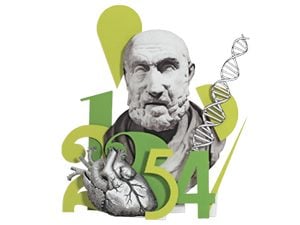Hippocrates’ Diet and Health Rules Everyone Should Follow
Updated: Apr. 16, 2016
All new doctors today still pledge to do no harm, which may be Hippocrates’ most famous legacy. But much of the ancient Greek physician’s wisdom applies to everyone—not just those who have medical degrees.

All new doctors today still pledge to do no harm, which may be Hippocrates’ most famous legacy. But much of the ancient Greek physician’s wisdom applies to everyone—not just those who have medical degrees. “Hippocrates was a visionary who figured out the most important ways we can stay healthy, all of which have been proved by modern science,” says David Katz, MD, founding director of the Yale University Prevention Research Center and author of the book Disease Proof: The Remarkable Truth About What Makes Us Well.
Here are five of his health rules that have stood the test of time (about 2,000 years).
1. Walking Is Man’s Best Medicine.
“Hippocrates did the first clinical studies by observing people and comparing their health habits,” says Brian Clement, PhD, codirector of the Hippocrates Health Institute, a nonprofit center in West Palm Beach, Florida. He noticed that “bodies grow relaxed and squat … through their sedentary lives,” which led to various illnesses. Those who walked more stayed well longer. So he often prescribed exercise.
Today’s translation: Dozens of studies show that even 30 minutes of walking a day lowers your risk for diabetes, heart disease, osteoporosis, and certain cancers. A recent National Cancer Institute study on more than 650,000 people found that those who walked briskly for just 150 minutes a week gained an average of 3.4 years of life expectancy. “There’s no drug that can give you those kinds of
benefits,” says Clement.
2. Know What Person the Disease Has Rather Than What Disease the Person Has.
Hippocrates meticulously examined his patients’ urine, stools, pus, and sweat. But he also observed their personalities, home environment, relationships, diet, and even their facial expressions before diagnosing and treating them. “He believed that it was impossible to understand illness without understanding the whole person,” says David H. Newman, MD, director of clinical research, Department of Emergency Medicine, Mount Sinai School of Medicine, and author of Hippocrates’ Shadow: Secrets from the House of Medicine.
Today’s translation: Dr. Katz treats a lot of patients for obesity, and one of the first things he asks is whether they have toxic relationships, a stressful job, or poor sleep. “There’s no way for these people to lose weight until they fix these issues,” he says. “You’ve got to find out what’s setting a problem in motion, then reverse engineer it. When you treat the whole person, weight loss—and many other medical problems—becomes astonishingly easy to deal with.”

3. Let Food Be Thy Medicine.
Hippocrates observed that “those who are constitutionally very fat are more apt to die quickly than those who are thin” and recognized that when people ate mainly a fresh, plant-based diet, they developed fewer diseases. His primary form of treatment was usually improving a patient’s diet.
Today’s translation: No matter what eating style you follow, if it’s based on unprocessed foods, colorful plants, and little added sugar, you’re likely to be healthier and live longer, says cardiologist Joel K. Kahn, MD, a Reader’s Digest columnist and the author of The Holistic Heart Book. Consider this powerful research: A 2013 study of more than 7,000 people published in the New England Journal of Medicine found that those who ate a Mediterranean-style diet were 30 percent less likely to suffer a stroke or heart attack than those assigned to follow a low-fat diet. The link between food and health has to do with epigenetics, the study of how lifestyle and environment influence the expression of your genes. Processed foods with sugar, animal saturated fats and trans fats, and artificial chemicals can activate disease-causing genes that might have stayed dormant otherwise; they also lack the healthy nutrients that activate protective genes, says Dr. Kahn.
4. Everything in Moderation.
OK, what Hippocrates really said: “Everything in excess is opposed to nature.” He recognized that the same remedy could heal in one dose but harm in a greater one. For example, he prescribed wine as part of a healthy diet and to combat pain in childbirth. But Hippocrates also observed that his patients developed gout if they continually drank to excess. When he convinced them to temper their habits, the inflammatory disease disappeared.
Today’s translation: “We all love to take good things to the extreme,” says Dr. Katz. “But exercise, water, supplements, and sleep can all be damaging if you overdo them.” Even too much kale can be harmful because it can prevent your thyroid from absorbing the iodine it needs.
5. To Do Nothing Is Also a Good Remedy.
In Hippocrates’ day, many quacks convinced sick people to undergo dangerous, unnecessary, and expensive procedures. “But Hippocrates believed that unless you had real evidence that a medical treatment was helpful, you shouldn’t use it,” says Dr. Newman.
Today’s translation: In this age of advanced medicine, it’s harder than ever for doctors to resist ordering tests, procedures, and treatments—even if they’re unnecessary. “I often point out to my patients that the best diagnostic tool we have is time,” explains Dr. Katz. “If we don’t know what to do, let’s not just do ‘something.’ Doctors have a knee-jerk reaction to order tests and procedures when they might even lead to harm.” Back pain, for example, will often resolve itself within three months with such simple remedies as ice, heat, over-the-counter pain relievers, and gentle exercise.
“A patient may say, ‘Look, I’m suffering, and you have to do something,’ which creates a lot of pressure on doctors,” says Richard J. Baron, MD, president of the American Board of Internal Medicine (ABIM) Foundation, a nonprofit established to improve medical professionalism. The result: pointless treatments like prescribing an antibiotic for a cold. “It certainly won’t help, and it could cause an allergic reaction, a yeast infection, or dangerous diarrhea, not to mention antibiotic resistance,” says Dr. Baron.
That’s why it’s essential that patients and doctors work together to avoid needless tests or drugs. If your doctor wants to prescribe medication at the first sign of high cholesterol or high blood pressure, ask if you can change your diet and exercise routine first, says Dr. Kahn.
The ABIM Foundation created a campaign called Choosing Wisely, in which dozens of specialty medical societies—from those of cardiologists to surgeons to gynecologists—developed lists of five procedures or tests doctors and patients should question. View them at choosingwisely.org/doctor-patient-lists.